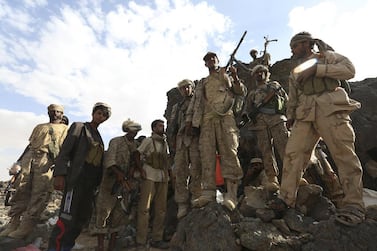President Donald Trump has confirmed that the US killed the leader of Al Qaeda in the Arabian Peninsula in a counter-terrorism operation in Yemen.
Qassim Al Rimi is believed to have become the group’s leader after a drone strike killed Nasir Al Wuhayshi in 2015.
"Under Rimi, Aqap committed unconscionable violence against civilians in Yemen and sought to conduct and inspire numerous attacks against the United States and our forces," Mr Trump said in a statement on Thursday.
"His death further degrades Aqap and the global Al Qaeda movement, and it brings us closer to eliminating the threats these groups pose to our national security."
The US regards Aqap as one of the deadliest branches of the Al Qaeda network founded by Osama bin Laden.
Mr Trump did not say when Al Rimi was killed but residents in the northern Yemen province of Marib reported a drone strike on the village of Al Hazmah on January 27.
"Early on Monday morning there was a blast in a small house in the Al Hazmah. It was followed by a chain of explosions that continued for more than 15 minutes," a resident of a nearby village in eastern Marib told The National.
“Neighbours in Al Hazmah confirmed that the people living in the house were suspected of being linked to Al Qaeda - they rarely appeared in the daytime,” the resident said.
“Lots of remnants of projectiles were found around the house, which was fully destroyed. Security forces who arrived four hours after the strike said it was used as a rocket store.”
Last week The New York Times reported US officials were confident Al Rimi had been killed in a US strike in January.
The officials said the he had been tracked for months before the drone strike.
Brigadier Thabet Hussain, an analyst in the Yemeni army, said he believed Al Rimi was killed in Marib.
"I say this because I know that Marib has been a safe haven for Al Qaeda for a long time, especially after the fatal blows inflicted on the organisation by the Security Belt Forces and the Elite Forces in the provinces of Abyan and Shabwa in southern Yemen," Brig Hussein told The National, referring to militias trained by the Arab military coalition supporting the government in Yemen's civil war.
"Such blows forced Al Qaeda leaders to flee far from the southern provinces. Also, Marib is the stronghold of Islamists from other factions that have close ties to Al Qaeda,” he said.
The US government had offered a $10 million reward for information on Al Rimi's whereabouts through its Rewards for Justice programme.
Aqap has maintained a foothold in Yemen despite a long-running US military campaign, including extensive use of drone strikes targeting members of the extremist group. Last April, the US military carried out six air strikes against Aqap in Yemen, the first strikes since Al Qaeda operative Jamal Al Badawi was killed by an American drone in January.
Elisabeth Kendall, a senior research fellow in Arabic and Islamic Studies at Pembroke College, Oxford University said Al Rimi's death might affect Aqap's operations but would not end its threat.
"Killing Qassim Al Rimi would be a blow to Aqap, but it would not be a fatal blow. There can never be a fatal blow once an ideology has taken root, as it has in parts of Yemen. There will always be another jihadi ready to step into the leadership breach, albeit the quality and scope of the operation may suffer," Dr Kendall told The National.
“Aqap is already at its weakest point for a decade. This is just one more blow. Aqap has already been decimated by drone strikes, infiltrated by spies, fragmented by infighting, and handicapped by a near total shutdown of its communications networks. But a die-hard core will always remain,” she said.
“Even if Rimi is removed from the scene, there are still four more leading Aqap figures on America's wanted list with rewards on their heads, let alone the splintered rank and file. The more Yemen continues to unravel with the recent re-escalation of hostilities, the easier Aqap will find it to survive and prosper again.”
Aqap has not yet acknowledged claims of Al Rimi's death.






